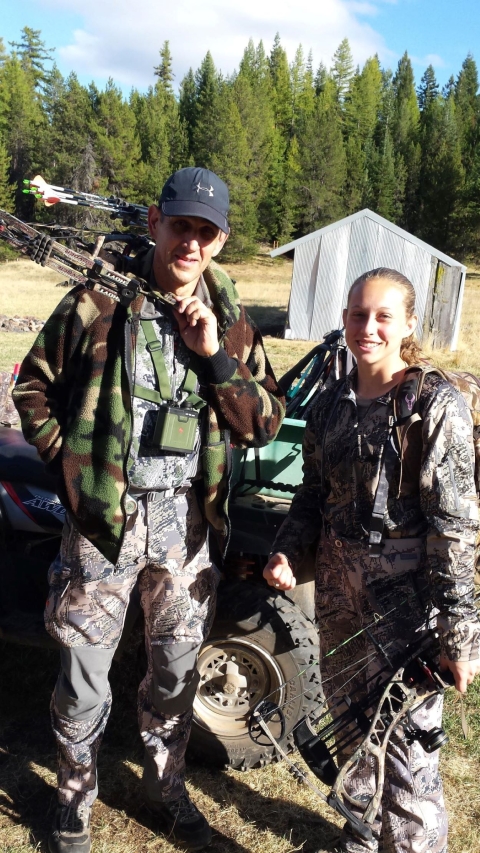To Emmett Walker, hunting is about ethics.
It’s about more than that too, of course. For Walker, hunting is also about family, food, being outdoors, and getting so close to majestic animals that he can reach out and touch them. It’s simply a part of life, the way Walker has lived ever since he shot his first deer when he was 15 years old.
Above all, hunting is about conservation. In America, hunters were among the first to push for conservation of lands and wildlife by advocating for hunting rules and places to be set aside for wildlife.
“Hunters are our eyes and ears out there for conservation,” Walker said. “We see things that other people don’t and we can help out.”
Hunting, ethics and conservation—these are values that Walker grew up with and has dedicated his life to sharing. For 25 years, Walker has been a volunteer hunting instructor with the Oregon Department of Fish and Wildlife. After taking his two oldest sons to hunter education classes, he and close friend decided to become teachers themselves.
“When I took hunter education classes when I was younger, we had little 5x6 pamphlets,” Walker said. “The primary thing we had to learn how to do was shoot. You couldn’t pass a course until you were a proficient shooter with a .22. Now we hand out something that’s like a little magazine, and the whole focus is on ethics.”
Walker spent his youth in eastern Oregon during the 1970s. He recalls his first hunt with his dad, grandfather, and uncle near his dad’s hunting cabin outside of La Grande, Oregon with warmth in his voice. Walker still owns that same cabin and it’s clear that his love for hunting has only grown in the 50 years since he harvested his first deer.
“I still get buck fever to this day,” Walker laughed.
Walker taught all six of his kids how to hunt, both with rifle and bow. While his youngest daughter may still be the most active hunter of the group, Walker believes that his kids learned much more than just the mechanics of shooting. They learned how to be stewards of the land.
“Hunting is a privilege,” Walker said. “It’s something that teaches you to respect others, respect animals, respect the land. The ethics of hunting is what I passed on my kids. It’s helped me be an all-around better person.”
When Walker hunts, he doesn’t just move over the land; he moves with the land, in harmony with wildlife and their habitat. He has a water trough for deer and elk on his property in the woods, and tore down one of his fences that was a danger to elk and put one up in accordance with Oregon Department of Fish and Wildlife guidelines.
Hunting is an opportunity to both take something from the land—an animal that could feed his family, in Walker’s case—and to give something back. Any time someone purchases hunting equipment, an excise tax is paid from the manufacturer to the federal government and set aside for conservation efforts. That money is managed by the U.S. Fish and Wildlife Service’s Wildlife and Sport Fish Restoration program and distributed to states and territories. Hunters also pay for licenses, tags and stamps where they hunt. These funds are used to benefit wildlife and habitat and provide public access.
In Oregon, money from hunting equipment excise taxes has helped to monitor wildlife populations based on information that hunters submit through tags and harvest cards. When hunters share information about their harvest, state biologists use that information to inform the next year’s hunting regulations, plan habitat conservation work, and proactively manage nature resources.
Idaho and Washington have also received funds to support conservation through hunting-related activities. Idaho Department of Fish and Game is using the grant money to take genetic samples from harvested animals and test for diseases like chronic wasting disease, brucellosis, and Treponeme associated hoof disease (also known as elk hoof disease) to better understand the health and population status of game species. Washington Department of Fish and Wildlife uses this funding for similar biological sampling and disease testing and to conduct annual wildlife surveys.
Walker likes to stay in touch with agencies and organizations that support hunting in Oregon, whether it’s to share information or be a part of the larger hunting community. He once came across an elk cow that he thought had elk hoof disease and sent a picture in to ODFW biologists to confirm. The elk did have the disease and ODFW was grateful for the report. Both state biologists and fellow hunters like to be aware of what’s going on out on the land, and Walker knows he can help.
“I try to encourage other hunters to share information,” Walker said. “It’s a little thing we can all do.”
Walker does the little things, both for the land and for conservation. He picks up garbage when he sees some lying in a pile of brush. He tries to make the best use of the meat that he harvests, and recently discovered delicious jerky recipes for both goose and duck. The knowledge he imparts in hunter education courses will be passed on through generations as new hunters become stewards of the land and teach their children how to do the same.
Walker talked about the 10x10x80 rule: That 10% of people hunt, 10% people don’t like hunting, and 80% of people don’t have an opinion. The hunter education classes he teaches are focused on those becoming hunters with an eye towards the 80%: helping people understand that hunters take care of the land and are major contributors towards conservation.
“You need to show respect,” Walker said. “Respect to hunters, to people who don’t hunt, to the animals, the land, and the landowners. We are both hunters and stewards of the land.”






